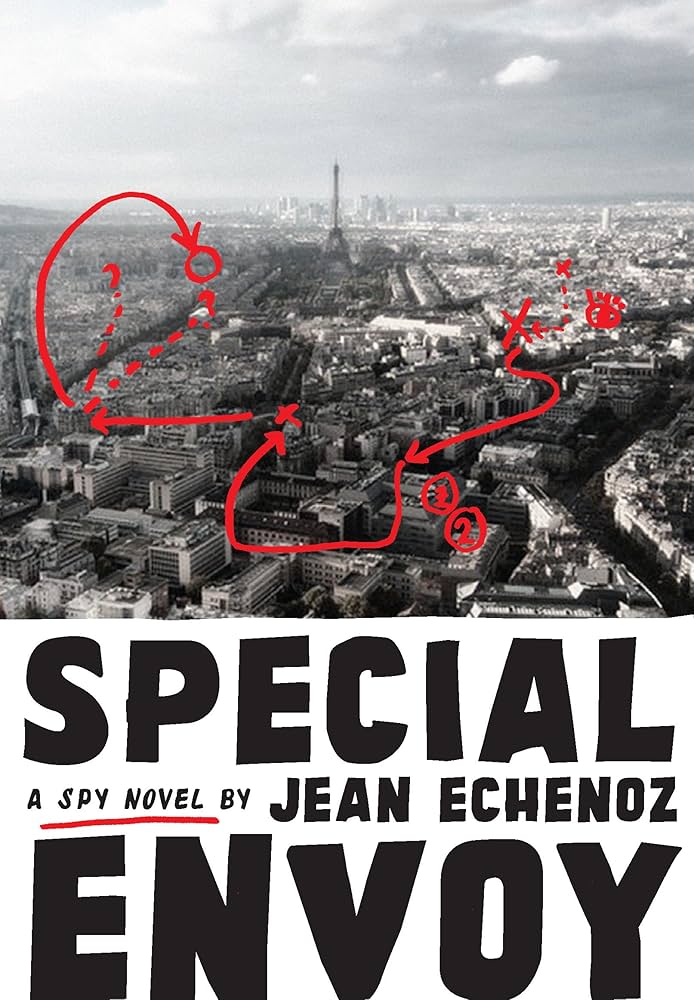by Adam McPhee

There are essentially two spy stories in this short novel: the first leans towards Jean-Patrick Manchette’s brand of noir—small scale, character driven, dictated to some extent by the unknowable whims of fate; the second is more John le Carré—or perhaps Le Bureau, to keep it French—it’s all geopolitics and deep cover missions. That is, when the novel decides to be a spy story at all.
We begin with a beautiful woman, Constance, kidnapped off the streets of Paris at the orders of a semi-retired general and taken to a safehouse in the French countryside. Her boyfriend, Tausk, a musician with one international hit song to his current name some years ago, and a botched bank robbery to his previous name before that, is sent the usual demand for ransom. He ignores this and the follow up in favour of starting an affair with his brother’s secretary, and then with the replacement secretary after the first one leaves him. The unanswered ransom demand is a pretty good bit, but I liked it more in The Kidnapping of Michel Houellebecq. The kidnappers send Tausk a severed finger, but it isn’t hers, they don’t have the heart to harm Constance.
In fact, they’re starting to fall for her. She’s been pretty agreeable about the kidnapping, doesn’t struggle or attempt to escape, enjoys the downtime in the countryside and spends her days reading through an old encyclopedia. One of the two henchmen makes a move. She laughs off his clumsy attempt at seduction. The rape mostly happens off page. The henchmen is ashamed, can’t look her in the eye, has his buddy apologize to her. But she waves it off, “I understand perfectly. The isolation, the lack of women, the boredom . . . I’m sure it’s not easy.” The three of them end up cooking a meal together. At first I thought this was too much, a bit of awful French nonsense. But it does sort of fit with a lot of stories that came out of #metoo, when women found their credibility under attack for trying to maintain a collegial atmosphere with their attackers after the horrific incident in question.
No, it’s the author’s understanding of Stockholm and Lima Syndromes that I think is off. No one wants to be taken hostage, and it’s Constance’s initial compliance with the kidnapping that’s out of place. Hostages and hostage takers form bonds when they both face the same outside pressure: in Stockholm because the police were shooting indiscriminately at bankrobbers and hostages alike, in Lima because the hostage takers realized they didn’t have it in them to kill their hostages.
Anyway, the hostage takers try to take Constance for themselves, and she goes with them willingly. She takes a bunk in a wind turbine three years before Christoper Nolan’s Tenet. She and the henchmen are, however, quickly caught and returned to the fold. This first half of the novel ends with the revelation of why Constance has been kidnapped in the first place: she was the singer on her boyfriend’s one international hit, and the song was particularly popular in North Korea. They plan to send her to Pyongyang to destabilize the regime.
This first half of the novel is marked by authorial digression, surreal details, and a strong use of coincidence and contrivance in the plot.
The plot coincidences/contrivances are many: Tausk’s new hairdresser is dating his former songwriting partner, who did a ten-year bid for their botched robbery; Tausk’s current songwriting partner commits suicide by jumping in front of the train Tausk happens to be riding in the cabin of, the secretary happens to be friends with a woman who is in on the kidnapping plot and who is the source of the pinky finger in the ransom demand. This is all fine, it keeps the novel chaotic and the reader guessing, but a lot of this end up going nowhere, spaghetti fallen to the floor.
Some of the surreal details add a comedic touch: a construction crew’s drill interrupts Tausk and the secretary’s meeting with renditions of classical music until they finally give up on their work and begin their romance. Certain passages are described in terms of movie shots: we hear of camera angles, casting decisions, even budgetary concerns—will this be on location or in a studio? And hell, why not? Half the time that’s how I mentally compose the words I’m reading anyway. But all this quickly grows tedious. A man has a birthmark that perfectly resembles the map of Papua New Guinea (wasn’t this also in a David Mitchell novel? I’m sure I’ve seen it before), there’s a recurring bit about the rutting habits of butterflies and elephants, it goes on and on. The book is barely 160 pages and yet still you get the sense he’s trying to pad this thing out.
This all, thankfully, slows down a bit in the section set in North Korea, which hews a little closer to the story. After all, it’s hard to do surreal imagery in a place that’s already so surreal on its own, and it’s hard to add plot contrivances and coincidences that feel spontaneous when you’re working against a stereotype of a brainwashed, obedient populace.
This is the North Korea of mid-aughts Vice scare stories. You have the ever present minders, the Koryo Hotel, the tourist excursion to the USS Pueblo, the suspicions that the passersby are all carefully choreographed. It’s updated a little bit too: a trip on the Kim family’s yacht confirms the cadres running the show aren’t strict Juche ideologues, they’re the same hedonist gluttons who’ve ruined everything, everywhere. The only difference here is that they’ve been cut off from the global oligarchy which they’re ostensibly at odds with.
Constance gets what she came for and then it’s off on a daring blitz across the DMZ, another nice update to the North Korean topos. You knew about the landmines, but did you know the place is essentially a nature preserve now, a vast strip rich in flora and light-footed fauna? I don’t know if the hovercraft is an Echenoz or a North Korean invention, but it’s a great touch.
Despite this, Echenoz’s North Korea only feels authentic insomuch as he’s done the reading to stay current on the latest depictions of the Hermit Kingdom, but there’s no attempt at insight. It’s a shame, because this second North Korea, the one belonging to the elites, might be an interesting way to examine our own deeply ingrained but unspoken set of double standards. But Echenoz isn’t interested in examination, and at this point he’s hardly interested in plot: Constance seduces her North Korean mark, they move in together—how does that work, how was it arranged? We don’t really find out. Constance passes a message back to Paris by simply meeting her former captor in the restaurant washroom at the hotel for foreigners. Really? It’s that easy?
Indeed, it’s all a little too smooth—but don’t worry, we’ll let the film guys figure it out.
Adam McPhee is a Canadian writer whose words have appeared in venues such as Old Moon Quarterly, Heavy Feather Review, and Ahoy Comics. He has been longlisted for the CBC Short Story Prize and he writes a newsletter, Adam’s Notes, on substack. He lives in Alberta.



Add your first comment to this post